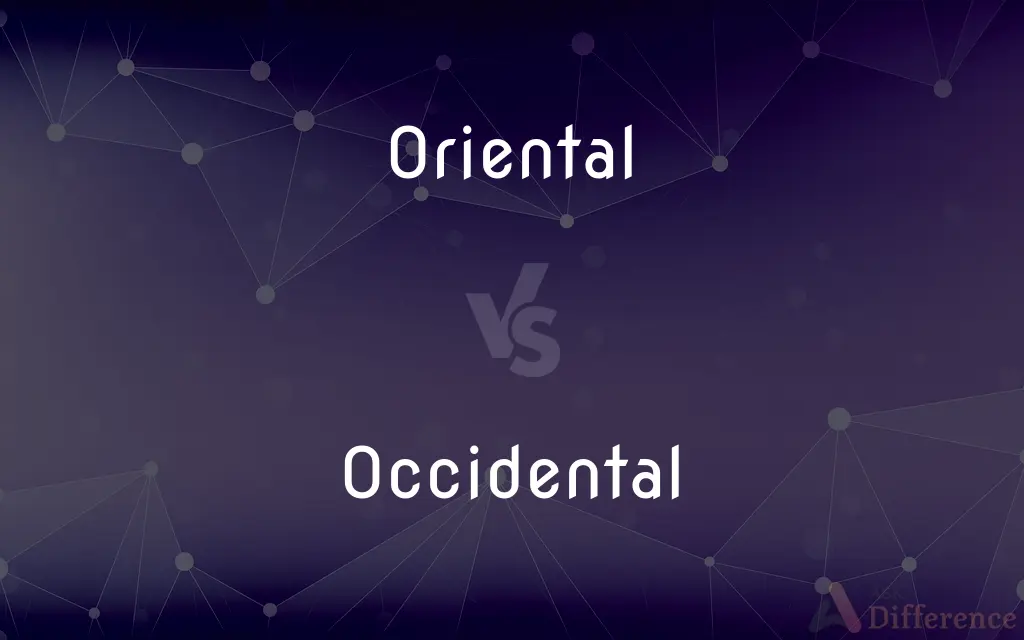Oriental vs. Occidental — What's the Difference?
By Tayyaba Rehman & Urooj Arif — Updated on January 30, 2024
Oriental refers to things related to the East, especially Asia, while Occidental pertains to the West, typically Europe and the Americas.

Difference Between Oriental and Occidental
Table of Contents
ADVERTISEMENT
Key Differences
Oriental, historically, described cultures, peoples, and artifacts from Asia, especially East Asia. Occidental referred to those from Western Europe and, later, the Americas. Both terms originated in a Eurocentric world view, where the 'Orient' was seen as exotic and often contrasted with the 'Occident'.
The term Oriental is often associated with ancient traditions, arts, and philosophies of Asian countries. Occidental, conversely, is linked with Western ideologies, technology, and lifestyle. The distinction implies a cultural dichotomy between East and West.
Geographically, Oriental denotes regions like China, Japan, and India. Occidental typically refers to countries like the United States, United Kingdom, and other Western European nations. This division is based on a traditional East-West divide on the world map.
The use of Oriental has evolved, becoming less preferred due to its connotations of colonialism and exoticism. Occidental remains in use but is less common, as terms like 'Western' are more frequently employed.
In contemporary discourse, Oriental is often replaced with more specific regional identifiers like 'East Asian' or 'South Asian' to avoid generalizations. Occidental, though less contentious, is also less used in favor of more precise geographical terms.
ADVERTISEMENT
Comparison Chart
Meaning
"Oriental" typically refers to things, people, or cultures from the Eastern part of the world, including Asia and the Middle East.
"Occidental" is used to describe things, people, or cultures from the Western part of the world, including Europe and the Americas.
Grammar Gender
In some languages like French, "Oriental" and "Occidental" may have gendered forms depending on the noun they modify. For example, "l'Oriental" (masculine) and "l'Occidentale" (feminine).
Gender forms are not as commonly associated with "Occidental" in some languages, making it potentially easier to use without modification.
Usage in English
"Oriental" has been criticized for its Eurocentric and outdated connotations. It is less commonly used in modern English and considered somewhat pejorative.
"Occidental" is rarely used in modern English and may sound archaic or overly formal.
Compare with Definitions
Oriental
Reflective of the traditions and cultures of the Eastern world.
The museum's Oriental exhibit showcases ancient Chinese artifacts.
Occidental
Pertaining to countries in Western Europe and the Americas.
Occidental art movements have shaped global art history.
Oriental
Characterized by or deriving from the traditions of the East.
The Oriental rug in the lobby was handwoven in Persia.
Occidental
Historically used to describe anything from the West.
Occidental languages include English, Spanish, and French.
Oriental
Relating to the geographical region of the Orient.
The Oriental landscape is marked by vast mountains and rivers.
Occidental
Relating to the geographical region of the Occident.
The Occidental climate varies greatly from north to south.
Oriental
Pertaining to countries in East and Southeast Asia.
The Oriental cuisine is known for its diverse flavors and spices.
Occidental
Relating to the countries of the West
Modern occidental society
Oriental
Historically used to describe anything from Asia.
Oriental philosophy has significantly influenced Western thought.
Occidental
A native or inhabitant of the West
He was gently apologetic when confronted by an angry Occidental
Oriental
Of, from, or characteristic of Asia, especially East Asia
Oriental countries
Oriental rugs
Occidental
Of or relating to the countries of the Occident or their peoples or cultures; western.
Oriental
(of a pearl or other jewel) orient.
Occidental
A native or inhabitant of an Occidental country; a westerner.
Oriental
A person of East Asian descent.
Occidental
Of, pertaining to, or situated in, the occident, or west; western.
Occidental climates, or customs; an occidental planet.
Oriental
Often Oriental Of or relating to the countries of the Orient or their peoples or cultures; eastern.
Occidental
Of a gem or precious stone: of inferior value or quality.
Oriental
Oriental(Biology) Of or designating the biogeographic region that includes South Asia south of the Himalaya Mountains and Southeast Asia from southern China to Borneo.
Occidental
A Western Christian of the Latin rite
Oriental
Of or relating to the Oriental Orthodox Church.
Occidental
Of, pertaining to, or situated in, the occident, or west; western; - opposed to oriental; as, occidental climates, or customs; an occidental planet.
Oriental
Lustrous and valuable
Oriental pearls.
Occidental
Possessing inferior hardness, brilliancy, or beauty; - used of inferior precious stones and gems, because those found in the Orient are generally superior.
Oriental
Of or relating to a genuine or superior gem
An oriental ruby.
Occidental
A native inhabitant of the Occident
Oriental
Relating to or designating corundum that resembles another stone in color.
Occidental
An artificial language
Oriental
Often Offensive An Asian, especially a South Asian, Southeast Asian, or East Asian.
Occidental
Denoting or characteristic of countries of Europe and the Western Hemisphere;
Occidental civilization
Hesperian culture
Oriental
A domestic cat of a breed developed in Britain from the Siamese and other breeds, having a long slender body and either a long or short coat in a wide variety of colors and patterns.
Occidental
Reflective of the traditions and cultures of the Western world.
The Occidental philosophy of individualism is influential globally.
Oriental
Alternative case form of Oriental
Occidental
Characterized by or deriving from the traditions of the West.
The university's Occidental studies program focuses on European history.
Oriental
Alternative case form of Oriental
Oriental
Of or pertaining to the orient or east; eastern; concerned with the East or Orientalism; - opposed to occidental; as, Oriental countries.
The sun's ascendant and oriental radiations.
Oriental
A native or inhabitant of the Orient or some Eastern part of the world; an Asiatic.
Oriental
Eastern Christians of the Greek rite.
Oriental
A member of an Oriental race
Oriental
Denoting or characteristic of the biogeographic region including southern Asia and the Malay Archipelago as far as the Philippines and Borneo and Java;
Oriental politeness
For people of South and East Asian ancestry the term `Asian' is preferred to `Oriental'
Asian ancestry
Common Curiosities
Can Oriental be used to describe people?
It's advised against due to its historical and colonial connotations.
What regions does Occidental typically refer to?
Generally refers to Western Europe and the Americas.
What does Oriental mean?
Refers to things related to the East, particularly Asia.
Why is Oriental considered culturally insensitive?
Because it generalizes diverse cultures and has colonial undertones.
Are there any acceptable contexts for using Occidental?
It's acceptable in historical or academic contexts but is less common in general discourse.
What are some synonyms for Occidental?
'Western', or specific names like 'European' or 'American'.
Why is it important to differentiate between Oriental and Occidental?
To understand the historical, cultural, and geographical distinctions between the East and West.
What does Occidental mean?
Pertains to things related to the West, especially Europe and the Americas.
Is the term Oriental considered outdated?
Yes, it is often viewed as outdated and culturally insensitive.
What are some synonyms for Oriental?
'Eastern', 'Asian', or specific regional names like 'East Asian'.
How is Occidental different from Oriental in usage?
Occidental is less sensitive and more geopolitical, while Oriental is more cultural and historical.
Is Occidental still commonly used?
Less common today, with 'Western' being more prevalent.
What is an alternative to using Oriental?
Use specific regional identifiers like 'East Asian' or 'South Asian'.
Has the usage of these terms evolved over time?
Yes, particularly Oriental, which has become less acceptable due to its implications.
Can Oriental be used in a positive context?
Context matters, but it's generally advisable to use more specific and sensitive terms.
Share Your Discovery

Previous Comparison
Discreet vs. Discrete
Next Comparison
Fit vs. FittedAuthor Spotlight
Written by
Tayyaba RehmanTayyaba Rehman is a distinguished writer, currently serving as a primary contributor to askdifference.com. As a researcher in semantics and etymology, Tayyaba's passion for the complexity of languages and their distinctions has found a perfect home on the platform. Tayyaba delves into the intricacies of language, distinguishing between commonly confused words and phrases, thereby providing clarity for readers worldwide.
Co-written by
Urooj ArifUrooj is a skilled content writer at Ask Difference, known for her exceptional ability to simplify complex topics into engaging and informative content. With a passion for research and a flair for clear, concise writing, she consistently delivers articles that resonate with our diverse audience.















































